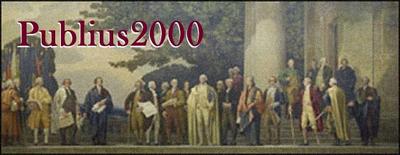The Debate Goes On...
One interesting analysis of the Miers nomination comes from Hugh Hewitt who has articulated these general themes on his radio show.
He argues that…
1. Bush and his team knew they did not have the votes in the Senate to defend the nomination of a known conservative. The Gang of seven (Snowe, Collins, Chafee, De Wine, Warner, McCain, and Graham; and perhaps even Specter) were not solid votes to override a Democratic filibuster. While they may have a 51 vote majority to confirm a conservative, they did not have a 60 majority to override the filibuster, nor a 51 vote majority to institute a rule change eliminating the filibuster.
2. Thus the timing is not right to have WWIII over the principle of whether or not judicial filibusters are Constitutional, and over what a legitimate judicial philosophy regarding Constitutional interpretation is. Because of weak Republicans, Bush did not have the numbers to have an all out war over the judicial nominee thus he went with a “stealth conservative” pick that is confounding both sides of the spectrum as to her true philosophy. (Bush may have miscalculated the depth of conservative anger over her however).
3. Bush may be banking on getting another nominee next summer (perhaps a big if…). If so senators facing election in November will be less inclined to vote against their Republican brethren when they know they will be facing Republican voters a mere month or two later. This may be the time to push for the Conservative nominee that we all want. Is it better to hold your fire now and save it for all out war later?
4. In the mean time Bush decided to go with someone he knows very well and “anti-Souter” in his mind since his father barely knew Souter. While she was not the best choice He knew “in his heart” that she would uphold an original intent standard even while no one else from the outside can be sure.
5. Hewitt also makes the observation that those justices that have not strayed to the left came directly out of working in partisan administrations (Rehnquist, Scailia, Thomas) and those that have strayed have come from the bench or have not been in directly partisan offices in a Presidential administration (O’Connor, Kennedy, Souter). He argues, Miers partisan credentials may provide the glue for her judicial philosophy.
I am not necessarily subscribing Hewitt’s views or to Bush’s potential strategy here, and it does include a lot of “ifs.” But, Hewitt’s analysis is the most novel I have heard and brings in the political constraints that may be influencing Bush’s thinking. The question of whether or not Bush would prevail in a war with the Dems now, and whether Republicans will be better positioned at a later date for all out war is a fair question. Also what is the best predictor of a justice who will not stray in their philosophy is a fair question. I am not sure I know the answer to that one.
He argues that…
1. Bush and his team knew they did not have the votes in the Senate to defend the nomination of a known conservative. The Gang of seven (Snowe, Collins, Chafee, De Wine, Warner, McCain, and Graham; and perhaps even Specter) were not solid votes to override a Democratic filibuster. While they may have a 51 vote majority to confirm a conservative, they did not have a 60 majority to override the filibuster, nor a 51 vote majority to institute a rule change eliminating the filibuster.
2. Thus the timing is not right to have WWIII over the principle of whether or not judicial filibusters are Constitutional, and over what a legitimate judicial philosophy regarding Constitutional interpretation is. Because of weak Republicans, Bush did not have the numbers to have an all out war over the judicial nominee thus he went with a “stealth conservative” pick that is confounding both sides of the spectrum as to her true philosophy. (Bush may have miscalculated the depth of conservative anger over her however).
3. Bush may be banking on getting another nominee next summer (perhaps a big if…). If so senators facing election in November will be less inclined to vote against their Republican brethren when they know they will be facing Republican voters a mere month or two later. This may be the time to push for the Conservative nominee that we all want. Is it better to hold your fire now and save it for all out war later?
4. In the mean time Bush decided to go with someone he knows very well and “anti-Souter” in his mind since his father barely knew Souter. While she was not the best choice He knew “in his heart” that she would uphold an original intent standard even while no one else from the outside can be sure.
5. Hewitt also makes the observation that those justices that have not strayed to the left came directly out of working in partisan administrations (Rehnquist, Scailia, Thomas) and those that have strayed have come from the bench or have not been in directly partisan offices in a Presidential administration (O’Connor, Kennedy, Souter). He argues, Miers partisan credentials may provide the glue for her judicial philosophy.
I am not necessarily subscribing Hewitt’s views or to Bush’s potential strategy here, and it does include a lot of “ifs.” But, Hewitt’s analysis is the most novel I have heard and brings in the political constraints that may be influencing Bush’s thinking. The question of whether or not Bush would prevail in a war with the Dems now, and whether Republicans will be better positioned at a later date for all out war is a fair question. Also what is the best predictor of a justice who will not stray in their philosophy is a fair question. I am not sure I know the answer to that one.


0 Comments:
Post a Comment
<< Home